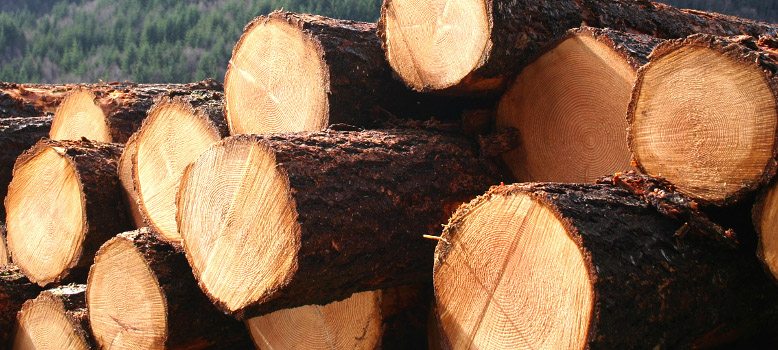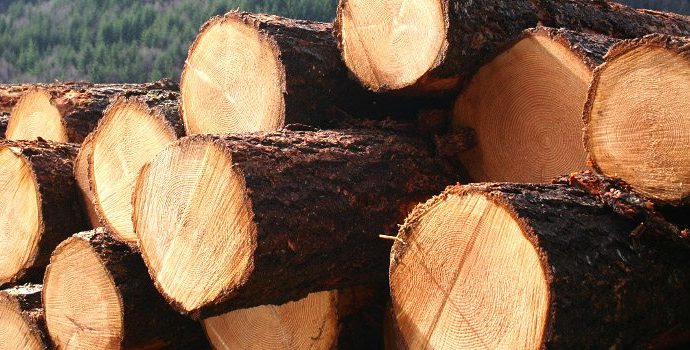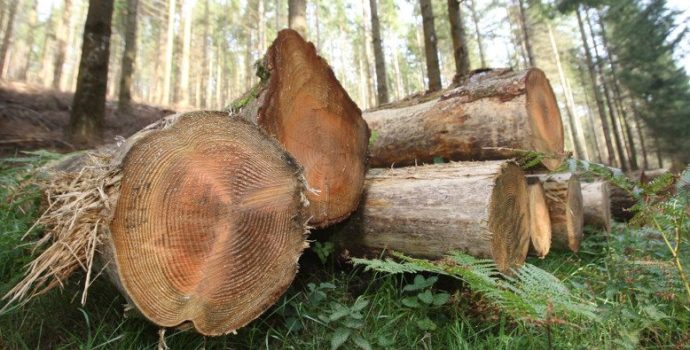Forestry Reports
Forestry Council Report November 2021

Market Review
- Timber, especially structural softwoods, has experienced very high prices over the course of 2021 due to increased demand and supply challenges, this demand continued over the summer months.
- The Timber Trade Federation (UK) market statement for October 2021 showed that timber prices, for structural softwood in particular, experienced rapid increases over the course of 2021. The average price of sawn and planed softwood in May, June and July rose by 55%, 65% and 88% respectively over their corresponding months in 2020. IFA have been unable to secure sufficient accurate information from growers on timber prices but prices received of in excess of €130 per tonne standing for sawlog.
- The chart below shows the volume of timber imported to the UK from Ireland, for more information click here.
- The shortage of HGV drivers will impact the timber supply chain in 2022, add to existing supply challenges, however it is forecast that demand is expected to stabilise.
- In October, a total of 454 forest licences were issued compared with 568 licences in September and 162 in August. The breakdown is as follows:
- 356 felling licences issued, 169 issued to the private sector and 258 issued to Coillte. 60% of the felling licences in October issued to Coillte.
- The breakdown of the licences that issued to the private sector is as follows: 49 afforestation licences, 57 forest road licence and 169 felling licences.
- Capital spending on the Forestry Programme so far in 2021 is approx. €62 million.
- Afforestation licences issued to plant 3,596, this represents a 5% decline on this time last year on licences issued.
The DAFM dashboard provides addition information:
Activity since last National Council
- IFA has issued a letter to both Michael Martin and Eamonn Ryan seeking a meeting to outline the deep frustration felt by farmers with forestry at the Governments’ handling of the forest licences crisis, to discuss a path forward to restore confidence and start the process of developing a regulatory system that supports planting and management forests at farm scale.
- Work is ongoing in relation to IFA taking a possible legal challenge to the forestry licencing regime, all relevant statutory and advisory documentation has been provided and parties are in regular communication.
- IFA sought legal opinion following comments by Minister McConalogue that the State owned of carbon credits in Irish forests, which confirmed that farmers own the rights to carbon sequestered in their forests and soils. This was subsequently confirmed by Minister Hackett who stated that the State does not own the carbon it accounts for this in the National Inventory Report.
- IFA issued a press release that IFA would challenge any attempt by the Government to interfere with a farmer’s rights to sell carbon removals and reductions from their forest to a voluntary carbon market.
- The Project Board of Project Woodland has presented its second interim report to Minister Hackett, although it has yet to be published on website. The key highlights from the report include:
- A full regulatory review of forestry licencing to be conducted by external consultants, Philip Lee which will be submitted in February 2022.
- Significant progress on both the proposals on pre-application discussion and the planning grant.
- Work on the next Vision and Strategy for Irish forestry has started with the community-based outreach through National Rural Network underway and a national attitudinal survey on forestry about to commence.
- IFA attended a study on private forest certification in Ireland steering committee meeting that has commissioned a report. As part of the process a review certification models and schemes were undertaken as well as a survey of private forest owners and industry. A draft final report was presented for comment that provided an overview of the current situation in Ireland as well as proposals to expand certification in the private forest sector.
- IFA attended the Coford Wood Mobilisation and Forecasting Group Meeting where private sector forest certification study, forest licences and All Ireland Forecast report were discussed.
- IFA is providing advice and information to farmers on a range of forestry issues on an ongoing basis, queries included timber sales, timber prices, ash dieback, forestry licensing, representation to the Department and taxation.
- The Climate Action Plan 2021 identified forestry as a core measure in meeting the climate targets and includes action to increase the annual afforestation rate (beyond the 8,000 hectares set out in the Climate Action Plan 2019) consistent with realising this ambition and achieving carbon neutrality no later than 2050, including promoting forest management initiatives to increase carbon sinks and stores. Some of the actions include:
- The new Forestry Programme in 2023 to focus on the importance of climate smart forestry.
- Afforest in pursuit of commercial, climate, water and biodiversity objectives, both through planting and natural regeneration
- Facilitate the creation of small native forests as part of our agri-environment schemes, avoiding poor citing of trees to ensure biodiversity as well as carbon goals are met.
- Continue to support the mobilisation of round wood, through initiatives such as investing in harvesting infrastructure, and research in timber and processing industries.
- Increase the monitoring of the forest estate to reduce illegal deforestation.
- Support will be provided to encourage the increased use of alternative management systems such as close to nature forestry and agro-forestry.
- Develop decision support tools to enable forest owners to make decisions on timing of harvesting (such as extended rotations) to optimise carbon storage
Upcoming Issues
- Continue work to secure changes to the licencing system and reduce the current backlog.
- Campaign for changes to the Reconstitution and Underplanting Scheme (RUS) to adequately compensate farmers for financial loss due to the disease.
- Increase farmer understanding of the value of the carbon stored in their forests over the rotation and operational carbon credit schemes.






